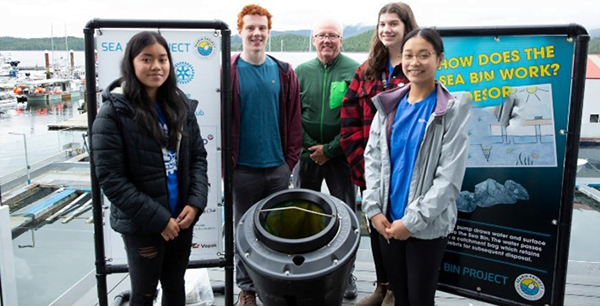Observant visitors to some of Prince Rupert’s docks may notice new additions: circular bins about the size of a residential trash can, attached to the docks, floating just above the surface of the water. These are Seabins, devices that prevent trash from polluting the ocean and impacting wildlife. The effort to purchase and install them was led by a group of young adults in the Prince Rupert community and aided by DP World Prince Rupert.
Identifying a Need
Prince Rupert is home to an active seaport serviced by DP World Prince Rupert. It’s also home to the Rainmakers Interact Club, a Prince Rupert Rotary-sponsored youth program at Charles Hays Secondary School. These students are supported and guided by advisors from the Rotary Club, but their projects and fundraising efforts are selected and researched by the teenage club members.
The Rainmakers are named after the average 212 millimetres per month of rain the Prince Rupert area receives. Appropriately, water is also integral to the shipping and recreation industries in Prince Rupert. The Rainmakers Interact Club members are highly aware of the importance of clean water and a healthy environment, which inspired their interest in Seabins.
How Seabins Work
Seabins are usually mounted to a dock because they require electricity to function, and the water nearby is relatively calm. As the dock rises and falls with the water, the Seabin does too. A pump in the bottom of the circular bin sucks in the surface water and expels clean water, filtering any trash and debris that might be floating on the surface. Sometimes the debris contains harmless organic materials, but often it’s the trash that one can see floating on the surface of calm waters near the land, such as plastic bottles and wrappers. The Seabins can even capture pollutants that are difficult or impossible to notice with the naked eye, like microplastics. Without the Seabins, these materials would eventually move further into the open ocean where they would further contaminate and harm the ecosystem.
An Intimidating Goal
When they learned of what Seabins could do, the Rainmakers Interact members were enthusiastic about their potential, but had some concern over how many units could be purchased. Seabins, individually, are about $8,400, and a dock area requires multiple dispersed Seabins to be effective. Electricity and wiring are another cost. In addition, there’s maintenance. The bins must be emptied periodically, the catchment bags replaced, and the pumps occasionally need to be repaired or replaced.
The club members approached their adult advisors in the Prince Rupert Rotary Club about their dilemma and the advisors suggested they persist. By reaching out to community members and potential partners, they advised, you’ll likely find support there. The students had identified an unmet need in Prince Rupert, and the advisors guessed that the community would respond when offered this solution.
A Community Comes Together
The Rotary advisors’ instincts were correct. The students and their advisors contacted local harbours and the Prince Rupert Port Authority and received even more interest than they expected once they explained the purpose and function of the Seabins. Several organizations were willing and able to take them on, and the number of bins wanted exceeded the club’s planned purchase. Ultimately a workable number of bins was decided upon, with the total project expected to cost $60,000.
With this figure in mind, the students began fundraising. The Ports Community Investment Fund contributed about half the total amount, which made the students’ work more manageable. The pandemic didn’t allow for many of the club’s usual fundraising strategies, but they found another way, organizing bottle recycling drives at schools and in the community. This raised about a quarter of the remaining amount.
To close the gap, DP World Prince Rupert contributed to the cause. The Lions Club joined with the Rotary Club, along with several area business in supporting the project as well. After starting with an ambitious and intimidating goal, the students ended up exceeding their initial expectations.
Ongoing Work
Now that six Seabins are in operation, the Interact Rainmakers’ work continues on the project to ensure replacement parts are available for the bins’ ongoing use. Already, the docks with Seabins are noticeably cleaner, and there are fewer accidents involving trash becoming jammed in boat propellers. Another benefit is that the presence of the Seabins themselves raising public awareness about the importance of clean oceans, of reducing waste and disposing of it properly.
How You Can Help
If you or your organization would like to support the Interact Rainmakers’ Seabins work, contact the Rainmakers Interact Club, through the Rotary Club of Prince Rupert and be sure to follow them on Instagram.
